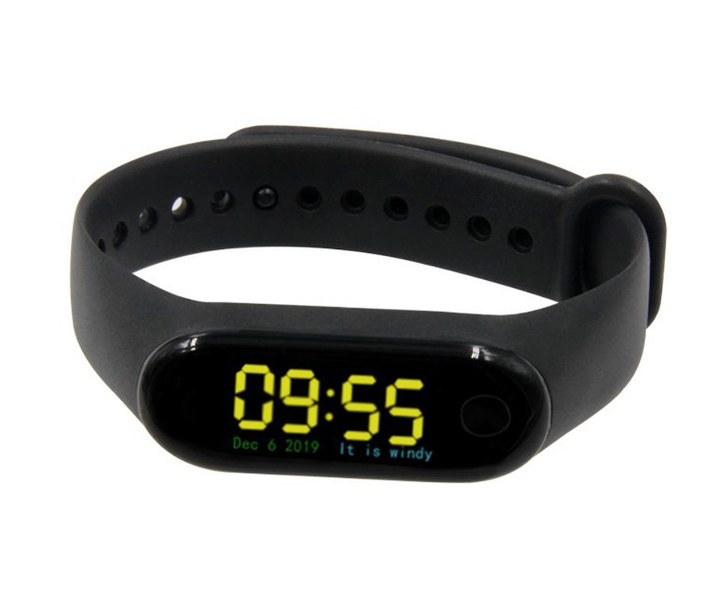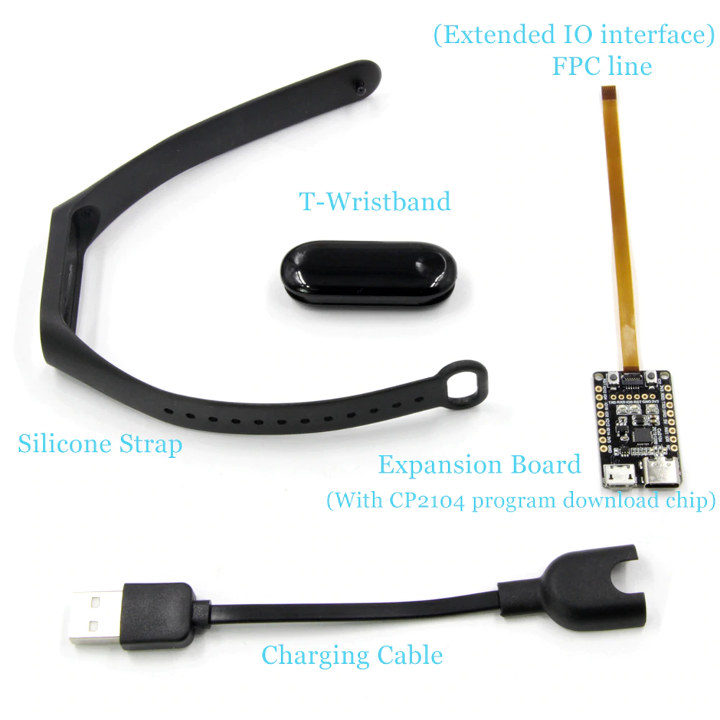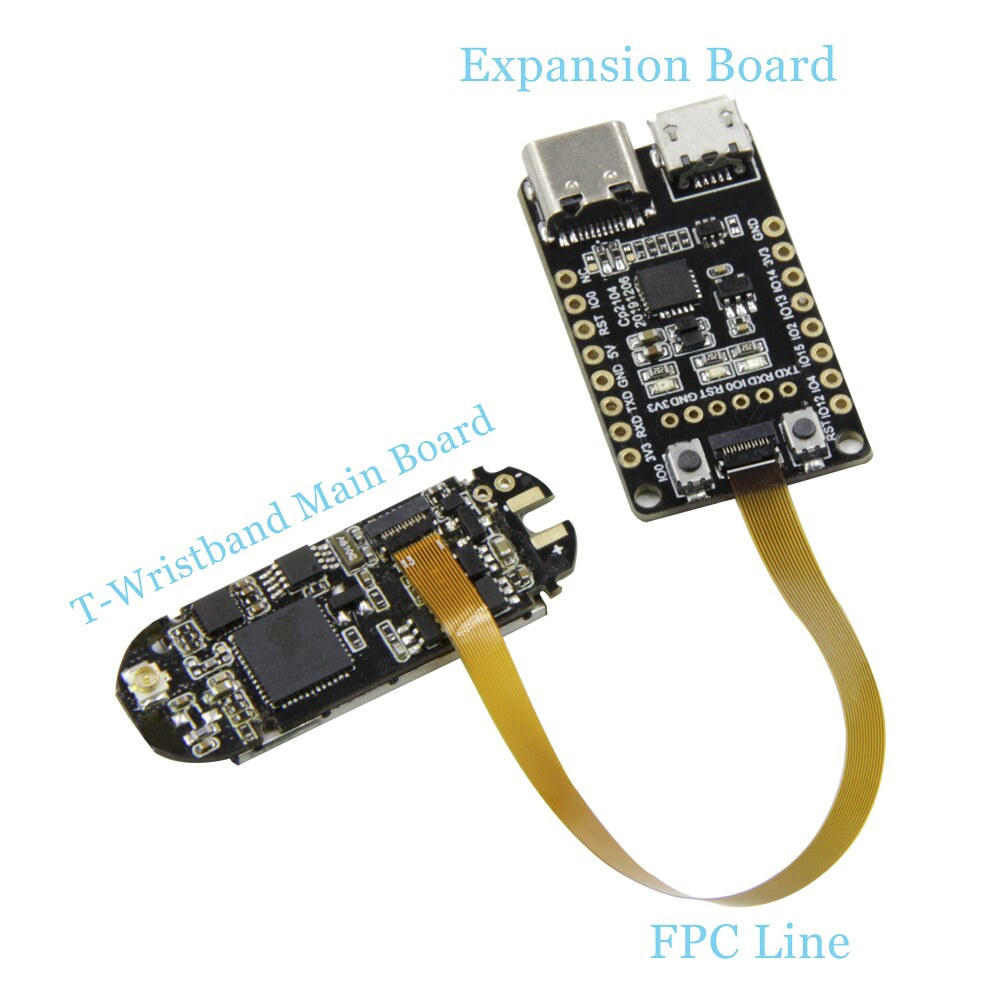2020 is promising to be an interesting year for low-cost user-flashable smartwatches/bracelets. After the recent introduction of the $25 Pine64 PineTime Bluetooth enabled wearable companion for PinePhone Linux smartphone that will support various real-time operating systems such as Zephyr OS or FreeRTOS, we’ve now been informed that Liliygo launched TTGO T-Wristband smart bracelet powered by Espressif Systems ESP32-PICO-D4 SiP.
The watch comes with 802.11 b/g/n WiFi 4 and Bluetooth 4.2 Classic+LE connectivity and is currently selling for under $18 and up on Aliexpress and Tindie.
 TTGO T-Wristband smart bracelet specifications:
TTGO T-Wristband smart bracelet specifications:
- SIP – ESP32-PICO-D4 system-in-package with ESP32 Tensilica LX6 dual-core processor, clocked at 240MHz, 520 KB SRAM, 802.11 b/g/n HT40 Wi-Fi, integrated dual-mode Bluetooth (classic + low energy)
- Display – 0.96″ IPS color display
- Antenna – WiFi / Bluetooth ceramic antenna
- Sensor – Invensense MPU9250 9-axis motion sensor
- Expansion / Programming Interface – 0.3pitch 13-pin FPC socket
- Misc – NXP PCF8563 RTC chip, touch button controlled via TTP223
- Power Supply & Management
- 80 mah rechargeable Lithium battery
- TP4054 charging chip
- Dimensions – 63 x 53 x 20 mm
- Weight – 30 grams
 TTGO T-Wristband ships with a silicone strap, a charging cable, and an expansion board for flashing the firmware, and provides access to extra I/Os. The CP2104 based expansion board exposes GPIOs, UART, reset, 3.3V and GND signals via unpopulated headers, and is fitted with a user button, a reset button, some LEDs, and both micro USB and USB-C ports used for communication and power.
TTGO T-Wristband ships with a silicone strap, a charging cable, and an expansion board for flashing the firmware, and provides access to extra I/Os. The CP2104 based expansion board exposes GPIOs, UART, reset, 3.3V and GND signals via unpopulated headers, and is fitted with a user button, a reset button, some LEDs, and both micro USB and USB-C ports used for communication and power.

The company released some hardware (PDF schematics) and software resources on Github. The firmware itself sadly appears to be closed-source, but the company released the Arduino sketch that makes use of the display, RTC, motion sensor, and WiFi, and implements support for OTA firmware updates over WiFi.
Beside Arduino Core, ESP32 supports FreeRTOS in ESP-IDF framework, Micropython, ZephyrOS, and other frameworks and operating systems. In theory, all those could be supported provided the community supports it.
That’s where PineTime has the edge at the moment since many people have started to work on PineTime devkit shipped earlier this month. PineTime also has a larger display, a larger battery combined with a more efficient microcontroller, and some features such as a vibrator and a heart rate sensor which are missing from LilyGO smart bracelet. TTGO T-Wristband does offer some advantages of its own however, with WiFi connectivity and the breadboard-compatible IO expansion board making it suitable for a wider range of projects.
Thanks to Conrad for the tip.

Jean-Luc started CNX Software in 2010 as a part-time endeavor, before quitting his job as a software engineering manager, and starting to write daily news, and reviews full time later in 2011.
Support CNX Software! Donate via cryptocurrencies, become a Patron on Patreon, or purchase goods on Amazon or Aliexpress






Programmable miband;)
Seems like a very powerful processor for a wearable. Any info on battery life?
Asked lilygo on Ali for battery life. Response did not contain info about that… So bug them too, perhaps eventually somebody will get a meaningful response…
80mAh battery … About 1 hour with WiFi enabled. But if you rarely collect sensor data without WiFi (alternating between modem sleep and deep sleep), you can last for 1-2 day.
Seems very similar to Xiaomi Mi Band 3…
Yes, that’s how I found this, looking for a hackable Mi Band. My proto-application for it is a U2F fob, for which the NRF52840 is obviously better because of it’s secure enclave, but this is more compact and easier to connect to USB.
I ordered one, and we’ll see how it behaves…